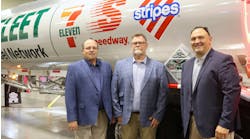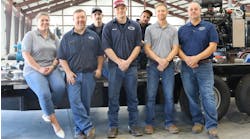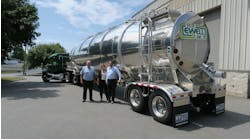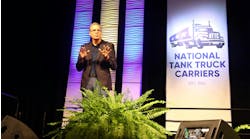Now 78 years old, Gary Short has poured his blood, sweat and oil into building Atlantic Bulk Carrier (ABC) for most of his life.
He doesn’t want it to go the way of Blockbuster Video after he leaves.
So as the company he founded in 1971 celebrates its 50th anniversary, nothing gives Short more comfort than knowing that the next generation of family leadership plans to keep ABC moving forward another 50 years.
“It makes me very proud,” the CEO said. “They could take the money and run, and that would be the easy way out, because we have a lot of equity built up in it. So I’m happy that they want to continue to operate.”
Keeping the business going isn’t without challenges—from the capital-intensive burden of expensive tank trailer equipment upkeep to the ongoing driver shortage worsened by a global pandemic. But the day-to-day difficulties are part of the fast-paced transportation industry’s allure, too. And, as president Mark Short freely admits—in a sentiment shared by many others—he’s uncertain what else he’d do. “I’m not sure you could pay (ABC vice president) Ward (Best) and I enough money to sit on the beach,” he quipped.
“And we’d probably drive our wives crazy if we stayed home.”
Instead, they continue to commute to ABC’s Richmond, Virginia headquarters, grateful for each day there, and driven to avoid complacency through steady organic growth—the company recently bought a turnkey terminal in Columbia, South Carolina—while fending off a growing list of suitors interested in acquiring or investing in the business.
And that kind of dedication is the alphabet soup for Gary Short’s soul.
“Making it to 50 shows that we’ve not only been successful with the tank truck business, we’ve been successful at taking care of our customers,” he said. “We’ve seen a lot of carriers come and go, and a lot of competitors come and go, and we continue to plug along, growing organically. That means a great deal to me.
“And I expect when the young people in our organization take over, they’ll continue to grow at a slow pace, and keep the growth organic.”
ABCs of the biz
Gary traces his industry roots to 1966, when he went to work cleaning trailers for Ryder Truck’s tank division less than a year before it was purchased by Chemical Leaman Tank Lines. He rose from the wash rack, to dispatcher, to terminal manager and eventually regional operations manager in a series of vertical moves that broadened his knowledge base, and sparked an overwhelming urge to strike out on his own.
Then Chemical Leaman delivered an offer he couldn’t refuse: They would sell him two tractors and lease them back, making him a lease operator. After seeing the success other operators experienced under the arrangement while working in dispatch, he viewed the chance as an “unbelievable deal.” And shortly thereafter, Allied Chemical decided to start shipping adipic acid from its Hopewell, Virginia plant, and since no one in the region had experience hauling the dry bulk material, Gary jumped at the opportunity.
Fifty years later, that first customer—which became AlliedSignal, later merged with Honeywell, and eventually spun off as AdvanSix—still is one of his best. “We’re extremely proud of that relationship,” Gary said. “It’s been a good one. And when I think about this 50-year milestone, it’s almost unbelievable.
“Things like that just don’t happen anymore.”
By 1980, when trucking industry deregulation hit, Gary’s lease operation with Chemical Leaman had grown to 20 trucks, and he had a flatbed fleet, so he decided to combine and incorporate the businesses as Atlantic Bulk Carrier Corp. in 1981. As the largest tank truck carrier based in Virginia, ABC now boasts about 200 power units and 600 tank trailers, with 180 drivers and 230 employees at 14 terminals serving customers throughout the United States, but primarily in the Southeast, including the Carolinas, Georgia, Alabama, Florida and Virginia.
ABC, which reported revenue of $46.5 million in 2018, hauls liquid and dry bulk materials in dedicated tanks. Of their approximately 700-800 loads per week, a little more than half are dry bulk, Gary said, including the Nylon 6 dry resin pellets produced by AdvanSix that are used to make fibers for carpeting, among other products. ABC also hauls plastic pellets—plastics make up a majority of the overall business—and aggregate materials like cement, clay and sand; and on the liquid side, it primarily deals in chemicals used as base materials or for water treatment.
“Our liquids include just about everything except food and fuel,” said Best, who’s also Gary’s son-in-law. “We don’t haul gasoline or avgas, and we don’t haul milk or orange juice. So it’s all chemicals on the liquid side, and about 50% are considered hazardous, so we’re doing both liquid and dry hazardous and non-hazardous products.”
Mark Short, Gary’s son, grew up in the business. The youngest of three children, he started with the company full time in 1992, when ABC still was running about 30 trucks, and took the role of president in 2002. He attributes their steady growth, typically around 10% annually, to the quality of their service and loyalty of their customers. “We don’t have any salespeople,” Mark said. “We never have. So all of our customers have been gained by word of mouth.
“We don’t go out and try to break into an industry. Customers reach out to us with different needs, and we tailor-fit solutions that keep them happy.”
Move-in ready
ABC’s new terminal was tailor-made for its South Carolina business.
The carrier already had operations in the state but lacked a central facility from which to serve its growing customer base, and maintain its equipment, and had been seeking a suitable location for years to no avail. Then company leaders learned Kenan Advantage Group (KAG) planned to shutter its Columbia operation and put the facility on the market—another opportunity Gary couldn’t pass up. “It worked out wonderfully,” he said. “We closed one day (in August, 2020), and we were moving equipment in the next.”
The 10,500-square-foot terminal and maintenance facility boasts a 2½-bay shop, and plenty of office space for administration and dispatch, situated on a 7-acre property with enough parking for about 75 pieces of equipment, allowing ABC to consolidate its operations in the Midlands and upstate parts of South Carolina. “We were already on the ground, so all we had to do was keep running and pick up the pace,” Best said.
ABC brought in Karen Hansel as terminal manager for the facility—situated just west of Columbia on Dooley Road in Lexington, with access to Interstates 20 and 26—and veteran mechanic Herman Lamb as shop manager. The shop, with a third mechanic hired this month, focuses on preventative maintenance and minor repairs to keep equipment up and running, and outsources major work to save time and money, Best said.
Mark credited growth of its South Carolina operation to ABC’s niche capability, and the efforts of South Carolina Gov. Henry McMaster, who has worked to bring industry back to the region, sparking upstate investment. “South Carolina’s been a high-growth state for us, so we’d been looking, and we heard through word of mouth something was for sale,” he said. “It ended up being better than we hoped, so we’re fortunate.”
Bulking up
ABC already had nearly 100 pieces of equipment in South Carolina alone—and more is on the way.
It has $19.5 million worth of equipment on order this year.
“We’re continuing to invest in the company, buy new equipment and expand,” Gary said.
ABC recently placed a second order for 100 new Peterbilt trucks, and ordered 36 J&L dry bulkers (12 vacuum units, 24 straight pneumatics) from Heil Trailer. The company expected to receive three new trucks a month for 12 months, and two trailers a month for 18 months, so new vehicles consistently are rolling in.
Some of the new equipment will replace older trucks and trailers, and some will go into dedicated service for new business, Mark said. “We have customers who deal only in certain colors of plastics, so we’ll dedicate equipment to them,” he said. “Pretty much, with the plastic industry, once we put a trailer into a specific service, we keep it dedicated to that service. So if they’re hauling PET (polyethylene terephthalate), we keep it in PET.”
ABC has spec’d disc brakes on trucks and trailers for years, and adds lift axles to trailers. New tractors feature the Bendix Wingman Advanced safety system, which combines collision mitigation and full stability technologies. The system also includes adaptive cruise control and lane-departure warnings; and ABC’s newest Peterbilts boast Bendix Blindspotter alerts, which help drivers avoid side-swipe collisions.
The carrier also outfits new tractors with Michelin tires and Alcoa wheels, along with Omnitracs electronic logging devices (ELDs) and BlackVue forward-facing cameras. “It’s been a steady march forward with the technology we’ve put into these vehicles, to make them both more comfortable and safer for our drivers,” Best said.
Trailer equipment includes Hendrickson’s TIREMAAX PRO tire pressure control system on the newest J&L dry bulkers, Hendrickson suspensions and Bendix disc brake systems, Dixon Bayco check and pop-off valves on the air lines, Bulk Tank Inc.’s Spin Flow filter system, and dual loading lines that help drivers load the trailers evenly from the rear. The lines were spec’d at bumper height to keep employees on the ground.
Paragon dry bulk blowers are mounted on most tractors for dry-product transfers.
“We want to keep a modern and updated fleet of equipment because it helps us to attract drivers, as well as provide the best level of service we can to our customers,” Best said. “So we aren’t doing this with a single purpose in mind. We’re trying to make these decisions as part of a holistic approach to the continuation and growth of the company.”
Driver ranks
ABC held onto most of its drivers in 2020, despite the pandemic’s impact.
But Mark said they’d like to be closer to 210 drivers—and if they hired 20 today, they’d all be on the road tomorrow.
“There is a lot of opportunity in the industry right now,” he said. “That might change, but right now you can do really well. There are capacity issues for chemicals and dry bulk, and you can see it on a daily basis, with people calling and saying, ‘Hey, can you do this for us?’ or ‘Can you dedicate equipment over here?’ and we just can’t do it.
“So I have to be honest and tell them they’re looking at 90 to 120 days before I could even get equipment in their area.”
Best said the company did see attrition as the pandemic set in, with some drivers retiring or leaving the industry. But as activity rebounded, they moved quickly—a luxury of their family-owned and -operated status—to aggressively recruit and onboard quality candidates. “We’re now back to a pre-pandemic level with our driver numbers, which I’m happy to say,” Best said. “I know a lot of people out there still aren’t.”
Pandemic-induced closures of driver training schools and state driver licensing agencies complicated hiring efforts, Best said, but Federal Motor Carrier Safety Administration (FMCSA) waivers that extended deadlines for renewing commercial driver’s licenses (CDLs) helped alleviate the situation. Of greater concern for ABC is a lack of similar waivers and extensions for renewing hazardous materials endorsements.
“What our drivers are having to do is set an in-person appointment, often months in advance—because it takes so long to get an appointment—so they may have an expired license, and an expired endorsement,” Best said. “So we’ve all been affected by government shutdowns, or closing in-person offices, and we need those activities to get back up.”
ABC pays drivers for every mile, whether their trailer’s loaded or empty. The company also pays for loading and unloading, layovers and breakdowns. Gary said they recently added $25 a night to cover FMCSA-mandated hours-of-service breaks. The result is a pool of drivers that earns, on average, $60,000 to $80,000 per year—with a handful who surpassed $100,000 last year. “Our drivers are well-compensated,” Gary said. “I never thought, 50 years ago, when I started, I’d see a driver making over $100,000 a year.”
Still, maintaining and expanding driver ranks amid the ongoing shortage is a growing problem exacerbated by the pandemic, and FMCSA’s newly instated Drug and Alcohol Clearinghouse, which Best says has further limited the labor pool. “That’s going to be a really big challenge for years to come,” Mark confirmed.
ABC raised its pay in 2018, but the industry caught up. Now the company is studying new ways to attract and retain young drivers, including flexible scheduling. “We’re trying to work with drivers to figure out their needs, and what days they want off, things like that,” Mark said. “A lot of has changed since 2018. But the next step is challenging because, from what we’re hearing, pay isn’t always the biggest issue anymore.
“So now we’ve got to decide, do we go out on a limb and increase our pay and not get any more qualified drivers in the door, and still lose some of our margins? Or do we figure out a better way to attract guys.”
Prized operation
ABC has no problem attracting investors.
“Once you reach a certain size, you land on people’s radar, and they start asking about your long-term plans, so you become a target for competitors and the private equity groups out there,” Mark said.
Gary understands the opportunity to sell will be there when he walks away. The calls have only increased, and their offers can be tempting. And while they’re not looking to sell, they’re not hanging up on inquirers either. “You never want to say never, because you never know what’s coming down the pike,” Mark confided. “As far as the business we have here, it’s too good for us to let it go. We would be foolish to let something like this go. We’ve been blessed. But you never know. Some guy could have too much money and be out of his mind, and offer us an absurd amount to sell the business, and we’ll always entertain that.”
But the company founder isn’t concerned. He’s confident in his family’s commitment to keeping their business in house, and with good reason, Mark insists. His goal now is the same as Gary’s ever was: To provide unsurpassed customer service. And that still involves not growing too big, too fast—and refusing to relinquish control.
“It seems that’s the way the world’s going,” Mark said of increasing private-equity investment. “Economies of scale play a big role in that. You look at the restaurant industry, and the mom and pops struggled with COVID, while the franchises did rather well. So there’s probably a point where big business will dominate the future, but for right now we’re holding our own, so we’re going to keep going.”
The key is to go smart, expand with customers as they grow, increase market share within their existing footprint—and avoid causing problems.
It’s also important to remember bigger isn’t always better.
“It’s definitely not better when you’re providing service, and service is what we’re selling,” Mark said. “It’s good that you’re trying to entertain shareholders, but when it comes to your customers, they’re not happy when they can’t get an answer about why a shipment’s late, or have some other problem. That’s what keeps us in business.”
Next 50 years
It has for 50 years.
Now the Short family, including Gary’s daughters, ABC vice president Jennifer Zaun and Shannon Best—Ward Best’s wife—are focused on the next 50, while pausing to appreciate the past. “Time flies so fast, it’s hard to sit back and contemplate what’s already occurred, or appreciate the journey, especially in this industry, which is filled with day-to-day challenges,” Mark said. “But when you really look back, making 50 years is unique, for sure.
“As long as we keep doing what we do, and keep our customers happy, we’ll be here for the next 50 years.”
Gary just might be there, too.
Although he’s delegating more and more responsibilities, he still heads to the office almost every day, just like he did in 1971. But, he promises, he will consider retirement in another year and a half, or so. “I think at 80 years old I’ll be ready to look back, and decide whether or not I want to continue to work,” he said.
Ward thinks he already knows the answer.
“Gary’s not going to retire,” he said with a chuckle. “He loves it too much.”









